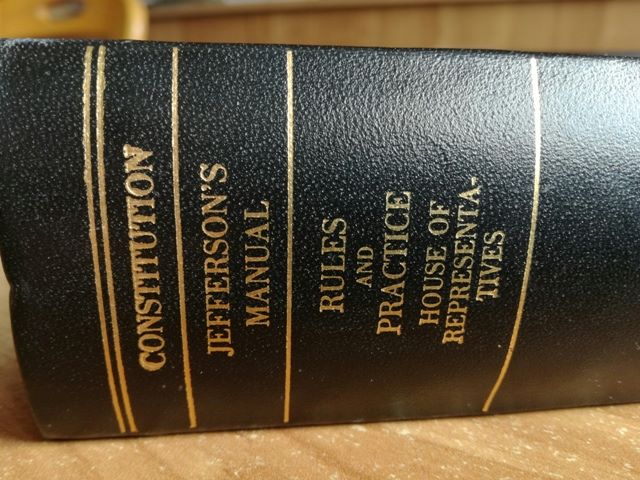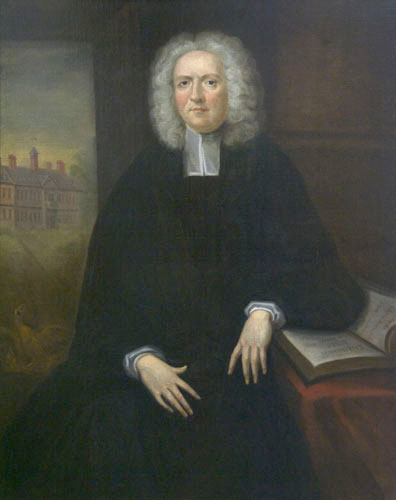|
Jefferson's Manual
''A Manual of Parliamentary Practice for the Use of the Senate of the United States'', written by Thomas Jefferson in 1801, is the first American book on parliamentary procedure. As Vice President of the United States, Jefferson served as the Senate's presiding officer from 1797 to 1801. Throughout these four years, Jefferson worked on various texts and, in early 1800, started to assemble them into a single manuscript for the Senate's use. In December 1800 he delivered his manuscript to printer Samuel Harrison Smith, who delivered the final product to Jefferson on February 27, 1801. Later, the House of Representatives also adopted the ''Manual'' for use in its chamber. Jefferson's ''Manual'' was based on notes Jefferson took while studying parliamentary procedure at the College of William and Mary. A second edition with added material by Jefferson was printed in 1812. The ''Manual'' is arranged in fifty-three categories from (1) The Importance of Adhering to Rules to (53) Impeac ... [...More Info...] [...Related Items...] OR: [Wikipedia] [Google] [Baidu] |
Thomas Jefferson
Thomas Jefferson (April 13, 1743 – July 4, 1826) was an American statesman, diplomat, lawyer, architect, philosopher, and Founding Father who served as the third president of the United States from 1801 to 1809. He was previously the nation's second vice president under John Adams and the first United States secretary of state under George Washington. The principal author of the Declaration of Independence, Jefferson was a proponent of democracy, republicanism, and individual rights, motivating American colonists to break from the Kingdom of Great Britain and form a new nation. He produced formative documents and decisions at state, national, and international levels. During the American Revolution, Jefferson represented Virginia in the Continental Congress that adopted the Declaration of Independence. As a Virginia legislator, he drafted a state law for religious freedom. He served as the second Governor of Virginia from 1779 to 1781, during the Revolutionary War. ... [...More Info...] [...Related Items...] OR: [Wikipedia] [Google] [Baidu] |
Parliamentary Procedure
Parliamentary procedure is the accepted Procedural law, rules, ethics, and Norm (sociology), customs governing meetings of an deliberative assembly, assembly or organization. Its object is to allow orderly deliberation upon questions of interest to the organization and thus to arrive at the sense or the will of the majority of the assembly upon these questions. Self-governance, Self-governing organizations follow parliamentary procedure to debate and reach group decisions, usually by voting, vote, with the least possible friction. In the United Kingdom, Canada, Republic of Ireland, Ireland, Australia, New Zealand, South Africa, and other English-speaking countries, parliamentary procedure is often called ''chairmanship'', ''chairing'', the ''law of meetings'', ''procedure at meetings'', the ''conduct of meetings'', or the ''standing orders''. In the United States, it is referred to as ''parliamentary law'', ''parliamentary practice'', ''legislative procedure'', ''rules of order'', ... [...More Info...] [...Related Items...] OR: [Wikipedia] [Google] [Baidu] |
Vice President Of The United States
The vice president of the United States (VPOTUS) is the second-highest officer in the executive branch of the U.S. federal government, after the president of the United States, and ranks first in the presidential line of succession. The vice president is also an officer in the legislative branch, as the president of the Senate. In this capacity, the vice president is empowered to preside over Senate deliberations at any time, but may not vote except to cast a tie-breaking vote. The vice president is indirectly elected together with the president to a four-year term of office by the people of the United States through the Electoral College. The modern vice presidency is a position of significant power and is widely seen as an integral part of a president's administration. While the exact nature of the role varies in each administration, most modern vice presidents serve as a key presidential advisor, governing partner, and representative of the president. The vice president ... [...More Info...] [...Related Items...] OR: [Wikipedia] [Google] [Baidu] |
Samuel Harrison Smith (printer)
Samuel Harrison Smith (January 27, 1772 – November 1, 1845) was an American journalist and newspaper publisher. He founded the ''National Intelligencer'' at Washington in 1800. He was elected a member of the American Philosophical Society in 1797. Career In 1800, Smith founded '' National intelligencer, and Washington advertiser'', which became the dominant newspaper of the capital. Joseph Gales joined the newspaper becoming his assistant in 1807, and took over the paper as its sole proprietor in 1810. Smith was a friend, confidant and counselor to the third U.S. President Thomas Jefferson. In February 1801, Smith published Jefferson's ''Manual'', "''A Manual of Parliamentary Practice for the Use of the Senate of the United States''." In 1813, Smith was appointed Commissioner of the Revenue for the United States Treasury Department by President Madison. On September 30, 1814, he was appointed as Secretary of the Treasury, ad interim, until a new cabinet officer was chose ... [...More Info...] [...Related Items...] OR: [Wikipedia] [Google] [Baidu] |
United States House Of Representatives
The United States House of Representatives, often referred to as the House of Representatives, the U.S. House, or simply the House, is the lower chamber of the United States Congress, with the Senate being the upper chamber. Together they comprise the national bicameral legislature of the United States. The House's composition was established by Article One of the United States Constitution. The House is composed of representatives who, pursuant to the Uniform Congressional District Act, sit in single member congressional districts allocated to each state on a basis of population as measured by the United States Census, with each district having one representative, provided that each state is entitled to at least one. Since its inception in 1789, all representatives have been directly elected, although universal suffrage did not come to effect until after the passage of the 19th Amendment and the Civil Rights Movement. Since 1913, the number of voting representat ... [...More Info...] [...Related Items...] OR: [Wikipedia] [Google] [Baidu] |
College Of William And Mary
The College of William & Mary (officially The College of William and Mary in Virginia, abbreviated as William & Mary, W&M) is a public research university in Williamsburg, Virginia. Founded in 1693 by letters patent issued by King William III and Queen Mary II, it is the second-oldest institution of higher education in the United States and the ninth-oldest in the English-speaking world. Institutional rankings have placed it among the best public universities in the United States. The college educated American presidents Thomas Jefferson, James Monroe, and John Tyler. It also educated other key figures pivotal to the development of the United States, including the first President of the Continental Congress Peyton Randolph, the first U.S. Attorney General Edmund Randolph, the fourth U.S. Supreme Court Chief Justice John Marshall, Speaker of the House of Representatives Henry Clay, Commanding General of the U.S. Army Winfield Scott, sixteen members of the Cont ... [...More Info...] [...Related Items...] OR: [Wikipedia] [Google] [Baidu] |
Impeachment In The United States
Impeachment in the United States is the process by which a legislature may bring charges against an officeholder for misconduct alleged to have been committed with a penalty of removal. Impeachment may also occur at the state level if the state or commonwealth has provisions for it under its constitution. Impeachment might also occur with tribal governments as well as at the local level of government. The federal House of Representatives can impeach a party with a simple majority of the House members present or such other criteria as the House adopts in accordance with Article One, Section 2, Clause 5 of the United States Constitution. This triggers a federal impeachment trial in the United States Senate, which can vote by a 2/3 majority to convict an official, removing them from office. The Senate can also further, with just a simple-majority vote, vote to bar an individual convicted in a senate impeachment trial from holding future federal office Most state legislatures ... [...More Info...] [...Related Items...] OR: [Wikipedia] [Google] [Baidu] |
Constitution Of The United States
The Constitution of the United States is the Supremacy Clause, supreme law of the United States, United States of America. It superseded the Articles of Confederation, the nation's first constitution, in 1789. Originally comprising seven articles, it delineates the national frame of government. Its first three articles embody the doctrine of the separation of powers, whereby the federal government of the United States, federal government is divided into three branches: the United States Congress, legislative, consisting of the bicameralism, bicameral United States Congress, Congress (Article One of the United States Constitution, Article I); the Federal government of the United States#Executive branch, executive, consisting of the President of the United States, president and subordinate officers (Article Two of the United States Constitution, Article II); and the Federal judiciary of the United States, judicial, consisting of the Supreme Court of the United States, Supreme C ... [...More Info...] [...Related Items...] OR: [Wikipedia] [Google] [Baidu] |
Lex Parliamentaria
''Lex Parliamentaria; or, A treatise of the law and custom of the Parliaments of England'', was a pocket manual for members of the Parliament of England first published in 1690. It was originally attributed to George Petyt. However, an attribution to Irishman George Philips seems now to be widely accepted, including by the historians Sir James Ware and Walter Harris. Thomas Jefferson praised the book in a letter to his son-in-law, opining, "For parliamentary knowledge the ''Lex parliamentaria'' is the best book.". Its American counterparts are Jefferson's own 1801 '' Manual of Parliamentary Practice'' and ''Lex Parliamentaria Americana'' by Luther Stearns Cushing. The term ''lex parliamentaria'' is also sometimes used to describe parliamentary law in general. See also *House of Commons of England The House of Commons of England was the lower house of the Parliament of England (which incorporated Wales) from its development in the 14th century to the union of England ... [...More Info...] [...Related Items...] OR: [Wikipedia] [Google] [Baidu] |
Parliamentary Practice
Parliamentary procedure is the accepted rules, ethics, and customs governing meetings of an assembly or organization. Its object is to allow orderly deliberation upon questions of interest to the organization and thus to arrive at the sense or the will of the majority of the assembly upon these questions. Self-governing organizations follow parliamentary procedure to debate and reach group decisions, usually by vote, with the least possible friction. In the United Kingdom, Canada, Ireland, Australia, New Zealand, South Africa, and other English-speaking countries, parliamentary procedure is often called ''chairmanship'', ''chairing'', the ''law of meetings'', ''procedure at meetings'', the ''conduct of meetings'', or the ''standing orders''. In the United States, it is referred to as ''parliamentary law'', ''parliamentary practice'', ''legislative procedure'', ''rules of order'', or ''Robert's rules of order''. Rules of order consist of rules written by the body itself (often ... [...More Info...] [...Related Items...] OR: [Wikipedia] [Google] [Baidu] |
1801 Non-fiction Books
Eighteen or 18 may refer to: * 18 (number), the natural number following 17 and preceding 19 * one of the years 18 BC, AD 18, 1918, 2018 Film, television and entertainment * ''18'' (film), a 1993 Taiwanese experimental film based on the short story ''God's Dice'' * ''Eighteen'' (film), a 2005 Canadian dramatic feature film * 18 (British Board of Film Classification), a film rating in the United Kingdom, also used in Ireland by the Irish Film Classification Office * 18 (''Dragon Ball''), a character in the ''Dragon Ball'' franchise * "Eighteen", a 2006 episode of the animated television series ''12 oz. Mouse'' Music Albums * ''18'' (Moby album), 2002 * ''18'' (Nana Kitade album), 2005 * '' 18...'', 2009 debut album by G.E.M. Songs * "18" (5 Seconds of Summer song), from their 2014 eponymous debut album * "18" (One Direction song), from their 2014 studio album ''Four'' * "18", by Anarbor from their 2013 studio album '' Burnout'' * "I'm Eighteen", by Alice Cooper commonly ... [...More Info...] [...Related Items...] OR: [Wikipedia] [Google] [Baidu] |







.jpg)